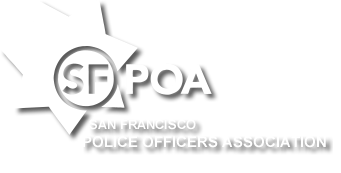It's that time of the year again, and the San Francisco Police Officers Association has met with the various candidates and heard arguments on the many propositions you will cast your votes for sometime between now and November 2nd. The underlying goal of our process is to help you make choices about the candidates and propositions that will ensure public safety is a top priority.
Of the 14 local propositions on the ballot there are three of major significance to our public safety officers.
First and foremost is proposition B, please vote NO. Proposition B is a draconian measure which unfairly targets working families and it is opposed by virtually every elected official in San Francisco. The Controller's impartial analysis of Prop. B concludes that 70 percent of the savings from the measure would come from dramatically increasing the cost of dependent health care for working families. The measure was poorly written, such that a janitor making less than $40,000 a year could have to pay the same for their health care as a top level manager making over $200,000. That isn't right, and that isn't fair. Vote NO on B.
Then there are propositions L and M which are linked by a political trick the Board of Supervisors added to M called a "poison pill." Proposition M, titled "Community Policing and Foot Patrols", sounds like a home run on its face, but don't be fooled. We already have foot patrols and they are deployed in the areas that are most needed by the Chief of Police. A fundamental question you need to ask yourself is; do you trust career politicians at the Board of Supervisors with your public safety, or do you trust Police Chief George Gascon? Furthermore, a principal component of M is the poison pill, which states that if M gets more votes than L, even if they both pass, L is nullified. Vote NO on M.
Proposition L is the sit/lie ordinance, also known as Civil Sidewalks. This is commonsense legislation being used with success in over 60 other U.S. cities. Detractors contend that police will use the legislation to target the homeless, but the reality is that the police will use the legislation to target behavior. Currently, business owners or residents who have someone blocking the sidewalk in front of their home have to file a complaint and be willing to testify in court in order to address the problem of people sitting or lying in the public right of way. This law would give the police discretion to ask these individuals to stand, and they would receive a warning before being cited.
Please, take a moment to review our recommendations, and vote with the San Francisco Police Officers Association to ensure San Francisco continues to make public safety a top priority.
Sincerely,
Gary Delagnes

